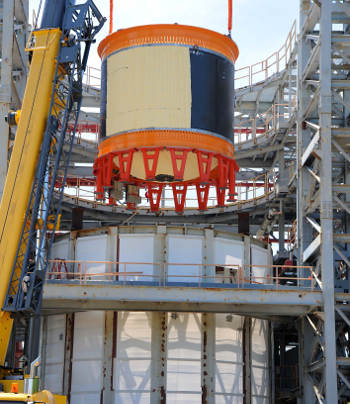An 18-foot diameter cryogenic fuel tank, made using new, lightweight composite materials, has successfully undergone a series of complex mechanical tests conducted by NASA at Marshall Space Flight Center.
 One of the largest composite cryotanks ever built recently completed a battery of tests at NASA's Marshall Space Flight Center in Huntsville, Alabama. Image Credit: NASA/David Olive
One of the largest composite cryotanks ever built recently completed a battery of tests at NASA's Marshall Space Flight Center in Huntsville, Alabama. Image Credit: NASA/David Olive
The successful completion of the sophisticated tests is a step towards the use of lightweight composites for the design and construction of tanks and other parts for rockets. As part of the tests, the tank was subjected to structural loads to simulate the physical stresses experienced by launch vehicles during flight.
The tank was also able to maintain fuels at very low temperatures and was tested for operability at different pressures. The tank was filled with over 130,000 liters of liquid hydrogen cooled down to a temperature of -253°C and subjected to a pressure cycle of 20-53 psi, the pressure range defined for the tests.
The composite rocket fuel tank was constructed by Boeing, located near Seattle. NASA's Super Guppy airplane delivered the tank to the Marshall Space Flight Center on March 26, 2014.
John Vickers, who is the project manager for the Composite Cryogenic Technology Demonstration Project, said that this is the result of a three-year initiative to design and construct a large high-performance tank with using new processes and materials, and to test by subjecting it to extreme conditions.
This demonstration is one step closer to use a technology in flight that could achieve 30% weight reduction and 25% cost savings for rocket tanks, he added. The project is part of the Space Technology Mission Directorate of NASA.
Advanced technologies such as composite systems show promise to improve the capabilities and reduce the cost of rockets, including NASA's Space Launch System (SLS).
The Space Launch System is a deep space rocket currently under development at the Marshall Space Flight Center, and is set for it's first unmanned launch in 2018. If the project stays on schedule, the SLS will be used to launch an unmanned mission to Mars in 2021, and the first manned explorations of the red planet in the 2030s.
NASA Tests Large Composite Rocket Tank